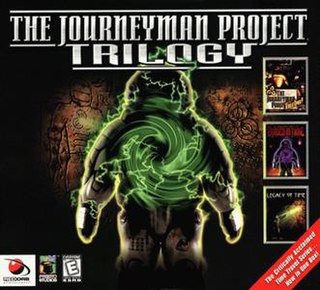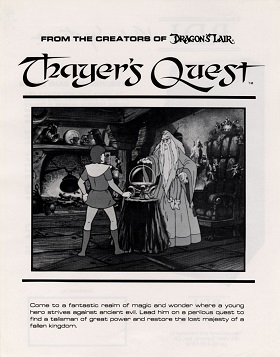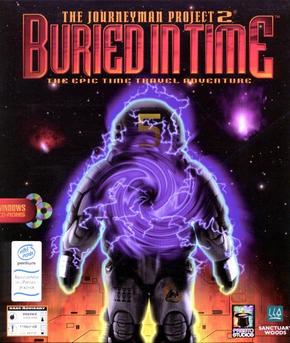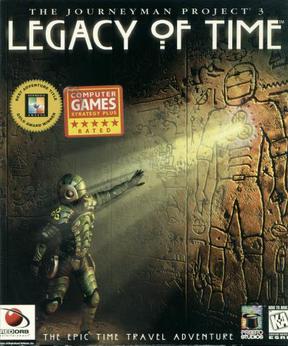
Nuon is a technology developed by VM Labs that adds features to a DVD player. In addition to viewing DVDs, one can play 3D video games and use enhanced DVD navigational tools such as zoom and smooth scanning of DVD playback. One could also play CDs while the Nuon graphics processor generates synchronized graphics on the screen. There were plans to provide Internet access capability in the next generation of Nuon-equipped DVD players.

Script Creation Utility for Maniac Mansion Virtual Machine (ScummVM) is a set of game engine recreations. Originally designed to play LucasArts adventure games that use the SCUMM system, it also supports a variety of non-SCUMM games by companies like Revolution Software and Adventure Soft. It was originally written by Ludvig Strigeus. Released under the terms of the GNU General Public License, ScummVM is free software.

The Journeyman Project is a time travel adventure computer game developed by Presto Studios.

Presto Studios was a computer game development company of the 1990s. The company is notable for its award-winning series The Journeyman Project as well as Myst III: Exile, the 2001 sequel to Cyan's Myst series.

The Journeyman Project is a series of award-winning first-person science fiction adventure games, created by Presto Studios and released by various publishers, including Bandai, Sanctuary Woods, and Red Orb Entertainment.

Star Wars: Dark Forces is a first-person shooter video game developed and published by LucasArts. It was released in 1995 for MS-DOS and Macintosh, and in 1996 for the PlayStation. The story is set in the fictional Star Wars expanded universe and begins shortly before the original Star Wars film, before flashing forward to a year after the film's events. The game's protagonist and playable character is Kyle Katarn, a mercenary working on behalf of the Rebel Alliance who discovers the Galactic Empire's secret Dark Trooper Project, which involves the development of a series of powerful new battle droids and power-armored stormtroopers.
The Panasonic M2 is a video game console platform developed by 3DO and then sold to Matsushita, a company known outside Japan by the brand Panasonic. Initially announced as a peripheral chip for the 3DO Interactive Multiplayer, it was later unveiled as a standalone console. The console was cancelled in 1997, but the M2 technology was incorporated into other devices.

X2 is an arcade-style side-scrolling shoot 'em up released during the Team17-Ocean collaboration era of video games that created the Worms series. It is the sequel to the Amiga shooter Project-X. Unlike its predecessor, this game was a console exclusive. Acclaim Entertainment was slated to publish the game in North America, but it was never released in that region. A Sega Saturn version of the game was scrapped during development, at least in part due to Acclaim withdrawing support for the Saturn.

Thayer's Quest is a LaserDisc video game initially developed by RDI Video Systems in 1984 for their unreleased Halcyon console, and later released in arcades as a conversion kit for Dragon's Lair and Space Ace. In 1995 it was ported to home consoles and PC under the title Kingdom: The Far Reaches. The arcade machine had a membrane keypad for controls instead of a joystick. To help players learn the daunting—for an arcade game—controls, a small holder containing instructional leaflets was attached to the cabinet. A sequel, Kingdom II: Shadoan, was released in 1996.

The Journeyman Project 2: Buried in Time is a computer game developed by Presto Studios and is the second game in the Journeyman Project series of computer adventure games.

The Journeyman Project 3: Legacy of Time is a computer game developed by Presto Studios and is a sequel to The Journeyman Project and The Journeyman Project 2: Buried in Time.

Worms is a 2D artillery tactical video game developed by Team17 and released in 1995. It is the first game in the Worms series of video games. It is a turn based game where a player controls a team of worms against other teams of worms that are controlled by a computer or human opponent. The aim is to use various weapons to kill the worms on the other teams and have the last surviving worm(s).
The Junior Field Trips series is a trilogy of point-and-click children's computer and video games released by Humongous Entertainment in conjunction with Random House. These games offered virtual tours of particular locations related to their theme, and included a game suite with virtual coloring pages, a scavenger hunt, and various other games depending upon the title. They were originally released for Windows and Macintosh computers, but were ported to Steam in April 2015. These games were written using the SCUMM engine and can thus be played on additional platforms by using ScummVM.

Street Fighter Collection is a fighting game compilation developed and published by Capcom for the Sega Saturn and PlayStation. It contains the original Super Street Fighter II, its follow-up Super Street Fighter II Turbo, and an enhanced version of Street Fighter Alpha 2 titled Street Fighter Alpha 2 Gold, which is exclusive to this compilation.
The LucasArts Archives are a series of CD-ROM personal computer game re-releases and compilations from publisher LucasArts.

WarGames: Defcon 1 is a video game for the PlayStation and Microsoft Windows developed by Interactive Studios and co-published by MGM Interactive and Electronic Arts. Although both versions possess the same missions and content, the PlayStation version is a tactical vehicle-shooting game while the PC version is a real-time strategy game. The game is loosely based on the movie WarGames; the story was scripted by John Badham, director of the original film.

The Apple Pippin is a defunct open multimedia technology platform, designed by Apple Computer, and marketed as PiPP!N. According to Apple, Pippin was directed at the home market as "an integral part of the consumer audiovisual, stereo, and television environment."














